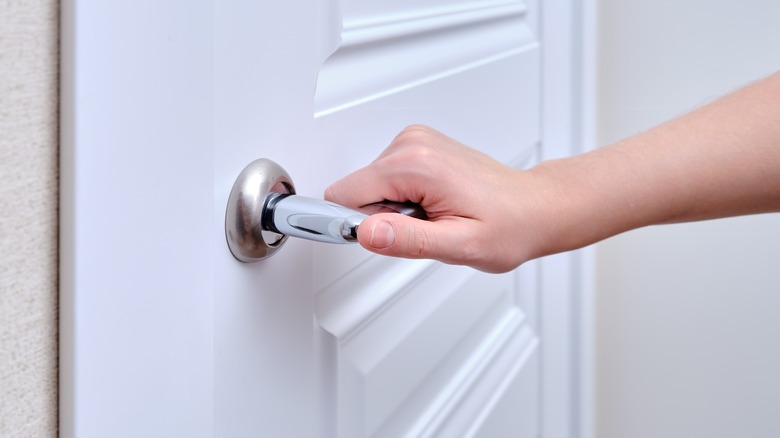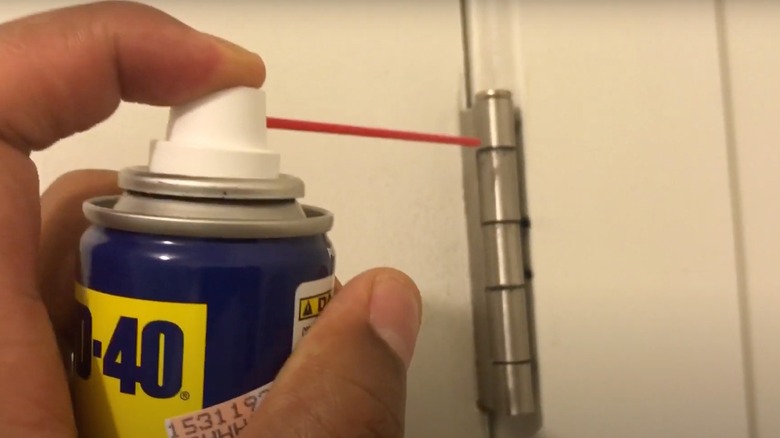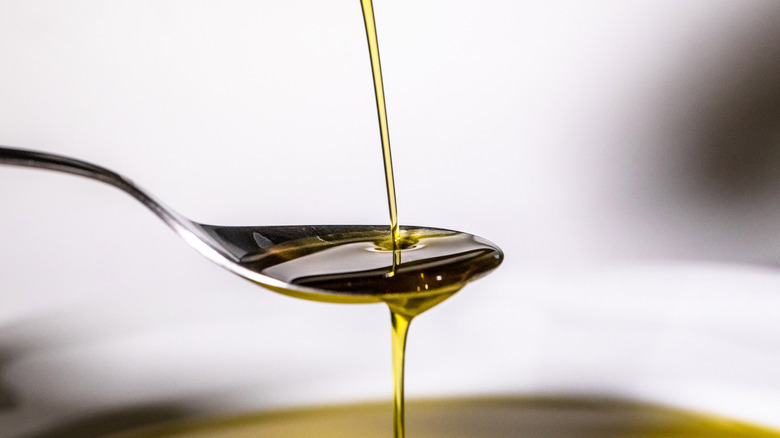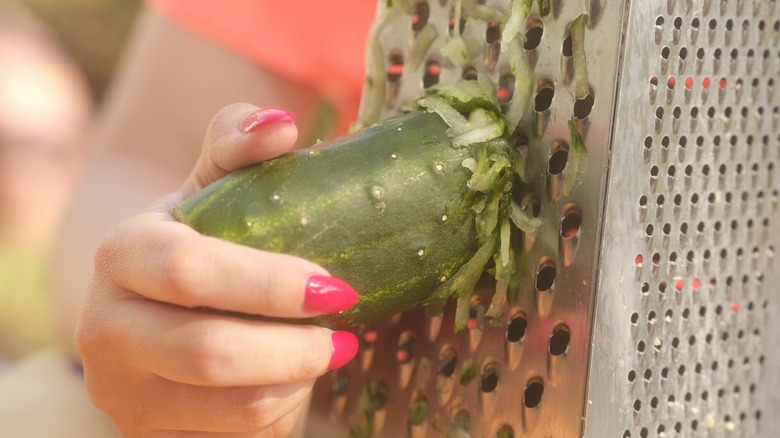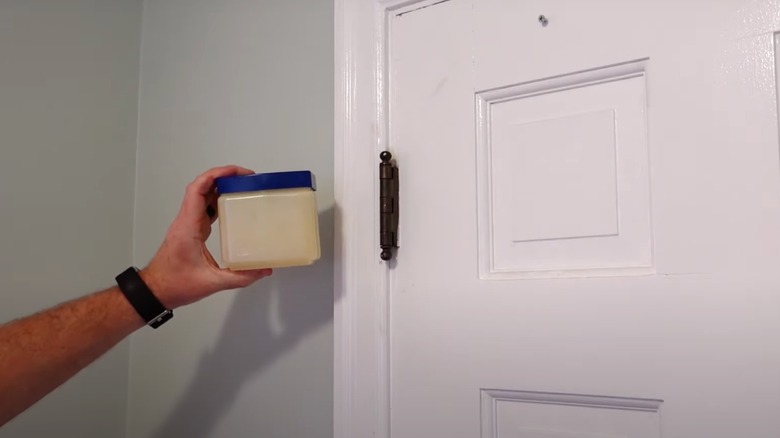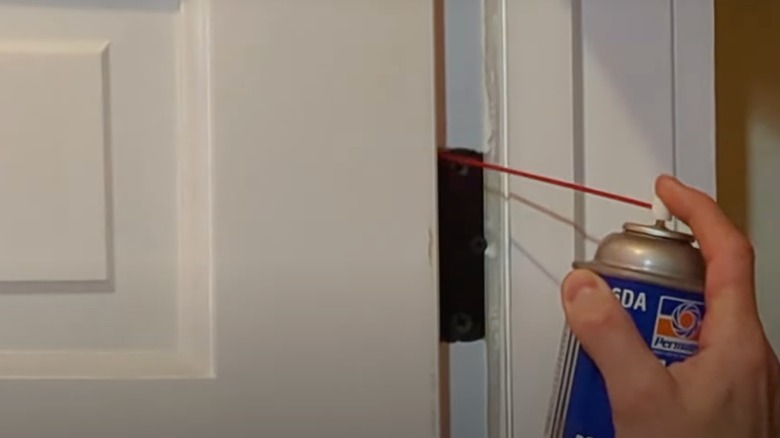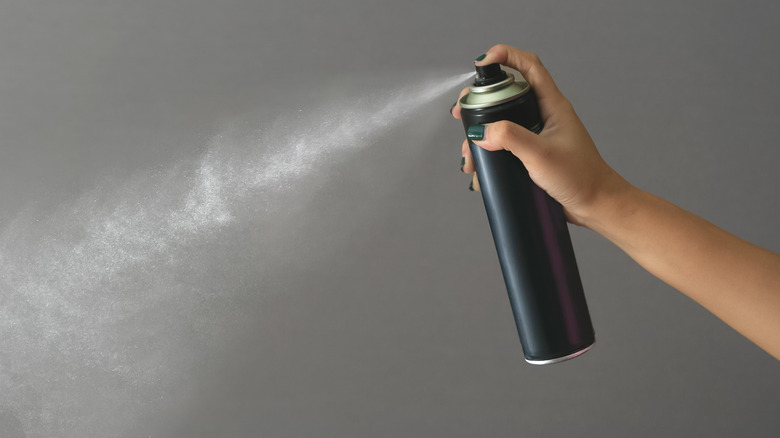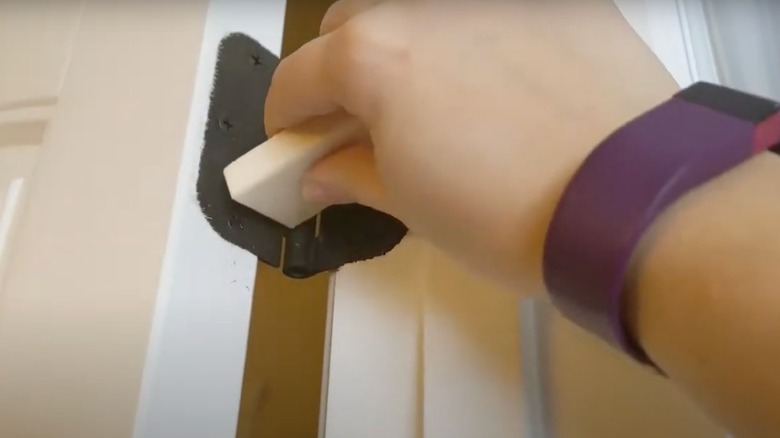Which Squeaky Door Hacks Are Worth Trying (And Those That Should Be Skipped)
It's not uncommon for homeowners and apartment renters to turn the knob of an old door and hear that familiar sound: squeak, squeak, squeak. There are a handful of reasons why your door might be squeaking, but the most common reasons include friction caused by another wooden material, broken hinges, and the buildup of dust and debris. Your door hinges depend on routine lubrication to help with their mobility, and without effective lubrication, they squeak. Thankfully, there are a number of foolproof hacks to solve that squeaky door problem of yours, and you may not need to look far to find the most effective products. Get ready to grab some cooking oil, petroleum jelly, silicone spray, hairspray, and bar soap, because you're about to address the problem at hand.
Before we get started, it's important to note that lubrication won't always be the solution to solving a squeaky door. If you happen to have old infrastructure, inconsistent flooring or are generally unsuccessful with your home improvement efforts, it may be time to call in a professional. While lubrication is a short-term solution to squeaky doors, doors are dependent on consistent upkeep to continue moving smoothly. If you happen to miss the mark on door maintenance, consider calling in a professional to examine the situation further.
Bad hack: WD-40
Knowing which hacks to avoid is just as essential as which hacks to try. For example, WD-40 is a popular solution suggested by home improvement experts to get rid of squeaky doors, but it's not an effective solution. While WD-40 is a great cleaning agent for basic household items, it should not be used on door hinges as it lubricates ineffectively, attracts dirt, and generally causes more damage than what you've started with. Instead, consider our alternative hacks for fixing that squeaky door for good.
Good hack: Cooking oil
It's likely you use cooking oil in the kitchen, so when it's time to fix those squeaky door hinges, just reach for this lubricating ingredient. Pour a spoonful of cooking oil on the metal hinge and allow the oil to saturate. If you'd rather pour the product directly, you may benefit from using a pipette to ensure the oil goes in the right direction. Alternatively, cooking oil from a spray will allow you to directly reach the affected area. Once you've completed dousing the hinge in oil, check if it worked by closing and opening the door.
Bad hack: Cucumber
Much like you would rub a cucumber against a box grater, some home improvement enthusiasts claim that cucumber is the secret to fixing a noisy door hinge — unfortunately, the hack is not all it's cracked up to be. Unlike other lubricating products, cucumber is mostly made up of water, making it inefficient for fixing squeaky doors. Although water is considered a common lubricant, it doesn't carry enough viscosity to grease the door hinges and prevent squeaky noises from occurring.
Good hack: Petroleum jelly
Another non-toxic solution and common household item used to fix squeaky doors is petroleum jelly. All you need to do is grab a handful of petroleum jelly in your fingers before rubbing it on the outside of the door hinge and massaging it until it reaches the inner corners. If that's not cutting it, remove the hinge pin and rub it in petroleum jelly before putting it back in its place. Not only should you expect your door to no longer squeak, but the petroleum jelly shouldn't leave behind the residue that other chemicals and oils are capable of.
Good hack: Silicone spray
Silicone spray is an essential item for many home improvement experts, especially if you're lubricating between two surfaces — it's also non-toxic and doesn't carry any mineral oils or grease. To use silicone spray on your door hinge, remove the door hinge pin, spray silicone in the hinge, and place the pin back before sealing it with the silicone spray as well. If there's an excess of product, use a paper towel or cloth to catch any drips. Move the door back and forth to ensure you don't hear any more squeaking.
Good hack: Hairspray
Believe it or not, there's an unexpected beauty product that effectively silences squeaky doors. Hairspray is created with polymers that can help uphold and maintain certain structures. Use an extra hold hairspray to directly spray the product over the door hinge. Once you've doused the hinges in hairspray, move the door back and forth to help the product absorb. Once the hairspray dries, the pins will be secured in place and are less likely to create a squeaking noise. While hairspray is a quick fix, you'll want to pivot to a long-term solution later on.
Bad hack: Paraffin candles
Paraffin candles are another popular household item used to fix squeaky doors, but the toxic effects of these candles outweigh any benefits. The hack consists of lighting the candles and rubbing the melted wax over the door hinges. Since paraffin candles are made from petroleum, however, they emit toxic fumes after being lit and can be absorbed into our lungs, leading to respiratory disorders like asthma and lung cancer. Regardless of the hack's success rate, it's best to avoid using paraffin candles on your door hinges.
Good hack: Bar soap
If your door hasn't stopped squeaking completely, consider using a bar of soap— the fat and oil used to create bar soap make it a great lubricant to use on door hinges. Start by thoroughly rubbing the bar soap against the door hinges until it's completely coated. Once each door hinge is covered, move the door back and forth to allow the product to soak into the hinges. Be sure to avoid using bar soaps that don't contain artificial ingredients like glycerin. Instead, opt for a natural bar soap that won't cause any long-term damage and will leave your door squeak-free.
